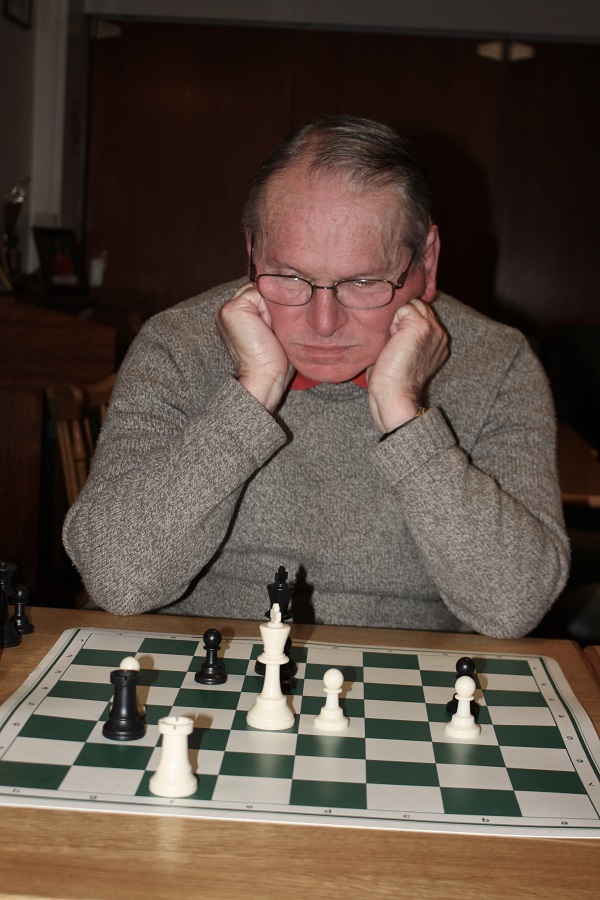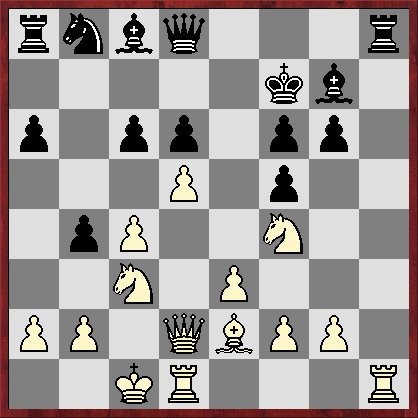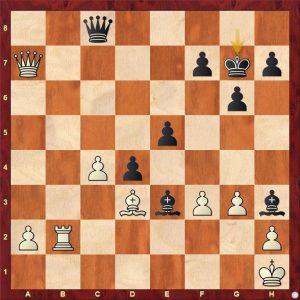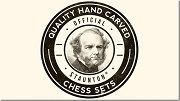Very sad news has reached the WCU that our FM Iolo Ceredig Jones passed away today after a long illness.
The WCU wishes to express our sincere condolences to Iolo’s family and friends at this very sad time.
There will be a private funeral on Wednesday September 15th at Aberystwyth Crematorium at 1pm.
Contributions, if desired, to Gwenllian Ward, Glangwili Hospital by Alun M. Esau, Funeral Director, Soar, Sarnau, Llandysul, Ceregion, SA446QS.
Obituary in English by Howard Williams
Iolo Ceredig Jones 1947-2021
Iolo passed away on 6 September 2021 just under a year after suffering a serious stroke, from which he never recovered. His contribution to chess in Cardigan, in Dyfed and in Wales generally has been immense.
Iolo was born in rural Ceredigion and, unlike most leading Welsh chess players of his generation, who came to the fore through schools’ chess and made their names playing in and for Wales as teenagers, Iolo was self-taught and never had the benefit of WCU coaching schemes. He first became known outside south-west Wales in the late 1960s as a Welsh Championship contender, finishing just behind the winners in 1968 and 1969 and continued to come close in the following years. It came as no surprise therefore when he was selected as a member of the Welsh team for our first ever Olympiad in 1972. But, far more strikingly, he then held his place in the Welsh team for the next 13 Olympiads, up to 1998, taking him to such far-flung venues as Buenos Aires, the Philippines, Moscow and the little-known Caucasian republic of Elista. He was not available between 2000 and 2008, needed at home to care for his ageing parents, but he regained his place for the 2010 and 2012 Olympiads. Iolo took one of the gold medals for his result at the 1990 Olympiad in Novi Sad (now part of Serbia) where he scored 6/7 and his performance in the 1998 Olympiad on Board 4 earned him the FIDE Master title. Perhaps his most memorable game was a narrow failure to beat the great Hungarian Grandmaster Lajos Portisch at the 1974 Olympiad in Nice. The game with Iolo’s typically modest notes is given below.

Iolo’s taste for international chess was not dulled during the last decade of his life. He was instrumental in ensuring Welsh entries in the European Seniors Team Championship (for over 60s) and later the World equivalent (for over 65s), playing Board 1 and captaining the team. He also led the ‘Cardigan’ team which played in the European Club Cup on three occasions between 2013 and 2016, earning its place through the Welsh Chess Premier League competition.
Iolo, together with his father the distinguished Welsh-language literary figure T Llew Jones and with Canon Seamus Cunnane, was responsible for founding the Cardigan Club (which first met in Llandysul in the sixties). Iolo went on to run the club for the next fifty years, during which it dominated other clubs in the Dyfed Chess League. Iolo’s contribution to Dyfed’s two annual individual tournaments was also enormous. In 1972, at a time when British weekend congresses were few and far between, the first Dyfed Open Congress took place at the Cliff Hotel, Gwbert, just outside Cardigan. 48 such events followed, attracting strong entrants from all over England and Wales, including a number of grandmasters who were often surprised to leave prize-less. Iolo himself won the top section on several occasions, most recently in 2017. In addition, Iolo was responsible for running the annual Dyfed Closed Championship where he acted as congress secretary and tournament controller, not to mention presenter of the prizes. At the time of his stroke Iolo also held the posts of Dyfed League Organiser and Dyfed Rating Officer and remained the Dyfed representative on the Welsh Chess Union’s selection committee.
Iolo co-authored with his father the only Welsh language chess book ever published, a book for beginners with a title, A chwaraei di Wyddbwyll? (‘Do you play gwyddbwyll?’). The title refers to a medieval Welsh tale relating a dream where King Arthur thus invites one of his noblemen to play a board game (which may have been chess) while the king’s soldiers fight outside against the nobleman’s flock of ravens.
At the board, Iolo’s was a distinctive presence. Firstly, his powers of concentration were immense. He almost never left the board during a game however long, not even to spend a penny, and turned the tables on many in the fourth hour of play and beyond, especially in the endgame. He never blundered. He was an especially difficult opponent with the black pieces, making it as hard as possible for his defences to be broken down. He would accept spatial disadvantages freely so long as he could avoid structural weaknesses. Casual attempts at attack were always repulsed and very few of his opponents ever recovered from the loss of material. His results might have been even better had he not sometimes shown excessive respect for the reputation of his strongest opponents.
Away from the board Iolo was always friendly, generous and convivial, fond of a pint (especially Doom Bar) and a glass of the red wine he had discovered on his chess excursions abroad. He got on well with all the members of the many chess teams he captained, itself no mean feat. He played local league cricket in his younger days. In recent years was a valuable member of one of the teams in the national poetry knock-out competition broadcast weekly on Radio Cymru, turning strict metre verse to comic ends, laughing for example at the Cardi’s reputation for thrift. He liked nice cars and female company.
All who knew Iolo will miss him hugely.
Obituary in Welsh by Howard Williams
Iolo Ceredig Jones 1947-2021
Bu farw Iolo ar 6 Medi 2021 ychydig yn llai na flwyddyn ar ôl iddo ddioddef strôc ddifrifol nad oedd gwellhad ohoni. Mae ei gyfraniad i wyddbwyll yn Aberteifi, yn Nyfed ac yng Nghymru benbaladr wedi bod yn anferth.
Cafodd Iolo ei eni yng nghefn gwlad Ceredigion ac yn wahanol i’r rhan fwyaf o chwaraewyr blaenllaw Cymru ei genhedlaeth, a ddaeth i’r brig drwy wyddbwyll ieuenctid drefnedig, hunan ddysgedig oedd Iolo ac ni fanteisiodd ar gynlluniau hyfforddiant Undeb Gwyddbwyll Cymru. Aeth yn adnabyddus y tu allan i Dde-orllewin Cymru am y tro cyntaf yn y 1960au diweddaraf wrth iddo gystadlu ym mhencampwriaeth Cymru, gorffen ychydig y tu ôl i’r enillwyr yn 1968 a 1969 a pharhau i ddod yn agos at y brig yn y blynyddoedd canlynol. Am hynny, ni fu syndod pan gafodd ei ddewis yn aelod o dîm Cymru ar gyfer ein Olympiad cyntaf erioed yn 1972. Ond yn llawer mwy trawiadol daliodd ei le wedyn ar gyfer yr 13 Olympiad nesaf, tan 1998 gan deithio i cyrchfannau mor wasgaredig â Buenos Aires, ynysoedd y Ffilipinau, Mosgo ac Elista, gweriniaeth anenwog yn mynyddoedd y Cawcasws. Nid oedd Iolo ar gael rhwng 2000 a 2008, am fod angen iddo aros gartref i ofalu am ei rieni yn eu henaint, ond adenillodd ei le ar gyfer y digwyddiadau yn 2010 a 2012. Cipiodd Iolo un o’r medalau aur am ei ganlyniad yn Olympiad Novi Sad (yn Serbia bellach) yn 1980, lle sgoriodd 6/7, ac enillodd deitl Meistr FIDE am ei berfformiad ar fwrdd 4 yn Olympiad 1998. Efallai mai ei gêm fwyaf cofiadwy oedd ei fethiant o drwch blewyn i faeddu’r Uwchfeistr mawr o Hwngari, Lajos Portisch. Ymddengys y gêm gyda sylwadau Iolo arni, sy’n nodweddiadol wylaidd.

Ni phylodd blas Iolo ar wyddbwyll ryngwladol yn ystod degawd olaf ei fywyd. Efe oedd yn allweddol wrth sicrhau bod timau o Gymru yn cymryd rhan ym Mhencampwriaeth Ewrop i chwaraewyr hŷn (dros 60) ac wedyn yn y gystadleuaeth fyd-eang debyg (i’r rhai dros 65), gan chwarae ar Fwrdd Un a chapteinio’r tîm yr un pryd. Arweiniodd hefyd dîm ‘Aberteifi’ a chwaraeodd yn y gystadleuaeth swyddogol i glybiau Ewrop deirgwaith rhwng 2013 a 2016, yn Rhodos, Skopje a Novi Sad, a hynny ar ôl iddynt ennill eu lle trwy Uwchgynghrair Gwyddbwyll Cymru.
Roedd Iolo, ar y cyd â’i dad, y llenor Cymraeg o fri, T Llew Jones, a’r Canon Seamus Cunnane, yn gyfrifol am sefydlu Clwb Aberteifi (oedd yn cwrdd yn gyntaf yn Llandysul yn y chwedegau). Aeth Iolo ymlaen i redeg y clwb dros hanner cant o flynyddoedd pan oedd y clwb yn tra-arglwyddiaethu dros glybiau eraill yng Nghynghrair Wyddbwyll Dyfed. Roedd cyfraniad Iolo i’r ddau dwrnamaint i unigolion a gynhelir yn Nyfed yn swmpus hefyd. Yn 1972, pryd roedd cystadlaethau dros y penwythnos o’r fath yn brin ledled Prydain, cynhaliwyd Cyngres Agored Gyntaf Dyfed yng Ngwesty’r Cliff, Gwbert, nid nepell o Aberteifi. Dilynwyd honno gan 48 digwyddiad tebyg wrth dynnu chwaraewyr da o bob rhan o Gymru a Lloegr gan gynnwys sawl uwchfeistr a gafodd ei synnu’n aml wrth ymadael yn ddi-wobr. Enillodd Iolo ei hun yr adran uchaf nifer o weithiau, yn ddiweddaraf yn 2017. At hynny, roedd Iolo yn gyfrifol am redeg Pencampwriaeth Gaeedig Dyfed yn flynyddol gan weithredu fel ysgrifennydd y gyngres, rheolwr y twrnamaint a hyd yn oed gyflwynydd y gwobrau. Ar adeg ei salwch roedd Trefnydd Cynghrair Dyfed, Swyddog Graddio Dyfed a chynrychiolydd Dyfed ar bwyllgor dewis Undeb Gwyddbwyll Cymru ymhlith swyddi gywddbwyll eraill Iolo.
Yn 1980 ysgrifennodd Iolo a’i dad yr unig lyfr gwyddbwyll Cymraeg ei iaith i’w gyhoeddi erioed, llyfr i ddechreuwyr a’r teitl, A chwaraei di Wyddbwyll?, arno, Mae’r teitl yn cyfeirio at y chwedl Gymraeg ganoloesol sy’n adrodd breuddwyd lle mae’r Brenin Arthur yn herio marchog i chwarae’r fath gêm yn ei erbyn wrth i filwyr y Brenin ymladd y tu allan â haid o gigfrain y marchog.
Wrth y bwrdd roedd gan Iolo bresenoldeb arbennig. Yn gyntaf, roedd ei allu i ganolbwyntio yn enfawr. Ni fyddai byth bron yn gadael y bwrdd yn ystod y gêm, ni waeth pa mor hir oedd hi, hyd yn oed i fynd i’r tŷ bach. Byddai’n troi‘r byrddau ar sawl un yn y bedwaredd awr o chwarae ac wedyn, yn enwedig yn y rhan derfynol o’r gêm. Ni fyddai byth yn bwnglera. Gwrthwynebydd neilltuol o anodd oedd Iolo gyda’r darnau du. Byddai’n amddiffyn mor wydn ag y bo modd gan ildio lle ar y bwrdd yn hytrach na derbyn gwendidau strwythurol yn ei safle. Bob tro byddai’n bwrw ymosodiadau difeddwl yn eu hôl. Ac ychydig iawn oedd y gwrthwynebwyr a lwyddai i achub y gêm ar ôl colli darn iddo. Efallai y byddai ei ganlyniadau wedi bod yn well byth pe na bai wedi dangos weithiau ormod o barch tuag at enwau mawr ei wrthwynebwyr cryfaf.
Oddi ar y bwrdd roedd Iolo wastad yn gyfeillgar, hael ac yn llawn afiaith, yn hoff o‘i beint (yn enwedig Doom Bar) a gwydraid o’r gwin coch roedd wedi magu blas arno ar ei deithiau gwyddbwyll dramor. Roedd ei berthynas ag aelodau’r timau niferus roedd yn eu harwain yn dda, a hynny’n dipyn o gamp. Roedd yn arfer chwarae criced mewn cynghrair leol pan oedd yn iau. Yn ddiweddar roedd yn aelod gwerthfawr un o’r timau lleol yn y gystadleuaeth farddonol wedi’i darlledu’n wythnosol ar Radio Cymru. Byddai’n troi’r gynghanedd at ddibenion ei hiwmor er enghraifft wrth chwerthin am ben y Cardi darbodus. Roedd yn hoffi ceir braf a chwmni benywaidd.
Bydd pawb oedd yn nabod Iolo yn gweld ei eisiau yn ddirfawr.
Games
Here are a few of Iolo’s games
Iolo Jones – Leon Burnett
Welsh Championship, Aberystwyth, April 1968 (Notes HW)
1.d4 d6 2.c4 f5 3.Nc3 Nf6 4.Bg5 g6 5.Bxf6 exf6 6.Qd2 Bg7 7.0–0–0 0–0 8.h4 Black has played rather routinely in response to Iolo’s unusual line against the Leningrad Dutch but needs now to decide what to do about his kingside. He should keep the h-file closed either with …h5 or else plan to meet h5 with g5 and h6 with Bf8 (rather than have the bishop entombed on h8); hence Black needs to play 8…h5 or 8…Re8 here. 8…c6 9.h5 Re8 10.hxg6 hxg6 11.e3 a6 12.Nge2 Kf7 13.Nf4 b5 14.Be2 Already White is threatening 15. Nxg6! and 14…b4 15 Na4 just loses the ‘b’ pawn. 14…Rh8 15.d5! Black would like to close the position to maximise his chances of living with the coming incursion into e6 but he is too far behind in development and the white knights are not to be thwarted. 15…b4

16.dxc6! Qe8 [16…bxc3 17.Qd5+ etc] 17.Rxh8 Bxh8 18.Ncd5 Qxc6 19.Nxg6! Bg7 20.Nge7 Qc5 21.Nxc8 Nd7 22.Ncb6 Nxb6 23.Nxb6 Qxb6 24.Qd5+ 1–0
Iolo played a substantial role in Wales’ qualifying for the ‘A’ group in the Nice Olympiad in 1974, rubbing shoulders with a large proportion of the best players in the world at that time. Here is Iolo’s near miss against the super-strong Hungarian grandmaster. The notes are Iolo’s.
Iolo Jones – Lajos Portisch
Olympiad Final A Nice (Rd 7), 21.06.1974
1.Nf3 c5 2.c4 g6 3.g3 Bg7 4.Bg2 Nc6 5.0–0 e5 6.Nc3 Nge7 7.d3 0–0 8.Ne1 [The knight is destined for c2 where, together with Rb1, it will assist in the advance b2–b4.] 8…d6 9.Nc2 Be6 10.Nd5 Qd7 11.Rb1 Rab8 12.Nxe7+ Nxe7 13.b4 b5 14.bxc5 dxc5 [14…bxc4 15.Rxb8 Rxb8 16.dxc4 dxc5 17.Qxd7 Bxd7 with fairly equal position is interesting.]
15.Rxb5 Rxb5 16.cxb5 Qxb5 17.Na3 Qa6 18.Qc2 Nf5 19.e3 Nd6 20.Rd1 Rb8 21.Bf1 [Threatening 22 d4 and also enabling White to play Na3–c4.] 21…Bg4 22.Rd2 [22.Re1 Qa5 23.Qd2 Qxd2 24.Bxd2 Rb2 wins for Black.; 22.Be2 Bxe2 23.Qxe2 e4 is also incorrect, since after the exchange of pawns, Black has a valuable asset in his passed “c” pawn.] 22…Qb6 23.Nc4 Nxc4 24.dxc4 Bf5 25.e4 Be6 26.Qd1 Qc7 27.Rb2 Rd8 28.Rd2 Rd4 29.Bb2 Rxe4?! [A dubious attempt at avoiding the very drawish position which arises after the natural 29…Rxd2 30 Qxd2.] 30.f3 Rd4 31.Bxd4 cxd4 32.Bd3 Bh6 33.Rb2 Be3+ 34.Kg2 Qa5 35.Qc2 Qc5 36.Qa4 Qc8 37.Qxa7 Bh3+ 38.Kh1 Kg7

39.Qe7? [An inaccurate move in my anxiety to reach the time control at move 40 – better was 39 Rb8!]
[39.Rb8 Qc6 (39…Qe6 40.Qc5+–) 40.Qa8+–] 39…Be6 40.Qd6 Qa8 41.Kg2 [The sealed move. In those days, the time control was 40 moves in 2,5 hours, with the game being adjourned overnight at the end of the 5–hour playing session. There was no ‘fast finish’. During the night, the Welsh team worked hard on the adjourned position and everyone was convinced that it was a certain win for White. But when I woke up next morning, I found a possible loop-hole for the Grandmaster to save himself. However, with an 8.30.a.m.start, there was no time to analyse the position further and we had to trudge off to the playing hall.] 41…Qa5 42.Qb4 Qc7 43.Qb5 Kh6! [The saving move for Black, since the queen no longer has to defend the pawn on e5.] 44.a4 Qc8 [The whole point of Black’s previous move becomes clear.] 45.h4 Bh3+ 46.Kh2 Bf5! 47.Qb3 Bxd3 48.Qxd3 Qc6 49.Kg2 Qxa4 50.Re2 Qa7! [Preventing 51 Rxe3.] 51.Qe4 Qa3 52.Qxe5 [Conceding the draw, but Black was threatening 52… Qc1.] 52…Qd3 53.Rxe3 dxe3 54.Qg5+ Kg7 55.Qe5+ Kf8 56.Qh8+ Ke7 57.Qe5+ Kd7 58.Qb5+ ½–½
The next game played in the last but one round of the Haifa Olympiad in 1974 is an example (one of many) of an over-optimistic opponent foundering on the rock of Iolo’s Old Indian Defence:
Bjoergvin Viglundsson (Iceland)- Iolo Jones (Notes HW)
22nd olm final Haifa ISR (12), 07.11.1976
1.d4 Nf6 2.c4 d6 3.Nc3 e5 4.dxe5 dxe5 5.Qxd8+ Kxd8 6.Bg5 c6 7.0–0–0+ (I long held the view that if I could castle queenside with check I must be winning.) Nbd7 8.Nf3 Kc7 9.Bh4 Bb4 10.Kc2 h6 11.a3 Bxc3 12.Kxc3 Ne4+ 13.Kc2 g5 14.Bg3 f5 (White is now in a serious mess – he should have exchanged his dark-square bishop when he had the chance.) 15.Rxd7+ Kxd7 16.Nxe5+ Ke6 (Probably this was White’s best bet but he does not have enough compensation for the exchange.) 17.f4 c5 18.e3 b6 19.Be1 Bb7 20.Rg1 Rhg8 21.Be2 Nf6 22.g3 Be4+ 23.Kc1 Rad8 24.b3 Nd7 25.Nxd7 Rxd7 26.g4 gxf4 27.exf4 fxg4 28.Bxg4+ Ke7 29.Bh4+ Kf8 30.Bg5 Rh7 31.Re1 hxg5 32.Rxe4 Rxh2 33.Be6 Rg7 34.f5 Rf2 35.Re1 g4 0–1
The next game is an example of Iolo’s ability to extract a win from a position which others would give up as a certain draw.
Iolo Jones – Tom Brown
Dyfed Open Fishguard (Rd 3), 27.02.2016
1.d4 Nf6 2.Nf3 g6 3.c4 Bg7 4.g3 c6 5.Bg2 d5 6.Nbd2 0–0 7.0–0 Bf5 8.Qb3 Qb6 9.Qxb6 axb6 10.b3 Ne4 11.Bb2 Nxd2 12.Nxd2 Rd8 13.e3 b5 14.cxd5 cxd5 15.Rfc1 Na6 16.a3 e6 17.b4 Bd3 18.Bf1 Bc4 19.Nb1 Nc7 20.Nc3 Rdc8 21.a4 Bxf1 22.Kxf1 bxa4 23.Nxa4 Nb5 (This position has to be quite level.) 24.Rc5 Nd6 25.Nb6 Rxa1+ 26.Bxa1 Rc6 27.Nd7 Rxc5 28.dxc5 Nb5 29.Bxg7 Kxg7 30.Ke2 f6 31.Kd3 Kf7 32.Nb6 Ke7 33.e4 dxe4+ 34.Kxe4 f5+ 35.Kd3 g5 36.Nc4 Kf6 37.f4 gxf4 38.gxf4 Nc7 39.Nd6 Nd5 40.b5 b6 41.cxb6 Nxb6 42.Nc4 Nd7 43.Kd4 Ke7 44.Ne5 Nb6 45.Kc5 Nc8 46.Kc6 Na7+ 47.Kb6 Nc8+ 48.Kc7 Na7 49.Nc6+ Nxc6 50.Kxc6 1–0
The game below may well have been Iolo’s last competitive game. The World Seniors was abandoned at about this point and the players returned home to lock-down. The game is typical of many Iolo wins. He doesn’t bother much about obtaining an opening advantage yet wins with comparative ease.
Iolo Jones – Kevin James (Ireland)
World Seniors Team Ch (Over 65 Section) Rd 6, Prague, 11.03.2020
1.d4 d5 2.Nf3 Nc6 3.Bf4 Nf6 4.e3 Bg4 5.Nbd2 e6 6.h3 Bh5 7.Bb5 Bd6 8.Bxd6 cxd6 9.c3 0–0 10.Be2 Re8 11.0–0 e5 12.Re1 Rc8 13.Nf1 Bxf3 14.Bxf3 e4 15.Be2 Ne7 16.Bb5 Rf8 17.Ng3 Ne8 18.Qb3 Nc7 19.Be2 a6 20.f3 Ng6 21.fxe4 dxe4 22.Bg4 Rb8 23.Nxe4 d5 24.Nd2 b5 25.Qc2 Rb6 26.Rf1 Nh4 27.Nf3 f5 28.Nxh4 fxg4 29.Rxf8+ Qxf8 30.hxg4 Qd8 31.Nf3 Ne8 32.Ne5 Nf6 33.Qf5 Ne4 34.Qf7+ Kh8 35.Rf1 Rf6 36.Rxf6 gxf6 37.Nc6 Qg8 38.Qxg8+ Kxg8 39.Ne7+ Kf7 40.Nxd5 1–0






